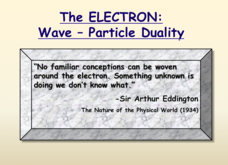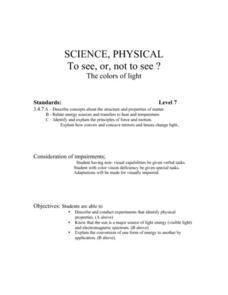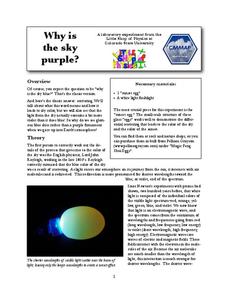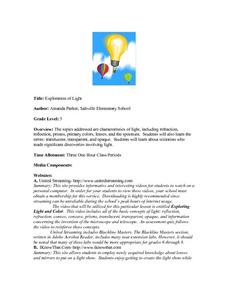Art Institute of Chicago
Color Combinations
Explore color through an examination of pointillism and light. Class members view Georges Seraut's famous painting on a computer, zooming in and out to see the details and effects of the technique. They then cover how light and color are...
Science Geek
The Dual Nature of the Electron
Why don't atoms collapse? Scientists debated this concept for years before they understood the dual nature of the electron. Presentation discusses the electron as both a particle and an energy wave. It also relates these concepts to the...
Curated OER
Emission Spectra
These attractive slides explain the basics of the electromagnetic spectrum and then display the emission spectra for a number of elements. argon, helium, hydrogen, xenon, neon and krypton are shown here and two graphs showing log scale...
Curated OER
To See or Not to See: The Colors of Light
Seventh graders describe and conduct an experiment that identifies the physical properties of light. They explore sources of visible light and an electromagnetic spectrum. Students explain the conversion of one form of energy to another.
Colorado State University
Why Is the Sky Purple?
The color of the sky depends on the time of day. Young scholars experiment with scattering different wavelengths of light to recreate the color of the sky. They observe both the longer blue wavelengths and the shorter red and orange...
American Chemical Society
Isolation of Phytochrome
Why do soybean plants that are planted weeks apart in the spring mature simultaneously in the fall? Four independent activities cover the history of phytochrome research, scientist collaboration, the electromagnetic spectrum, and...
It's About Time
Identifying Matter
High schoolers test wood splints that have been soaked in mystery solutions to identify the different colors it produces when lit. The lesson concludes with a reading passage and analysis questions.
Curated OER
THE MANY COLORS OF SUNLIGHT
Students examine rainbow components, spectral colors, colors perceived by the eye, hot solids, glowing rarefied gas, absorption, that light is a wave, and optics.
Curated OER
Diversity of Colors
Students investigate color diversity by experimenting with jelly beans. For this color spectrum lesson, students observe colored jelly beans through different filters and light sources to change the existing look of the bean. Students...
Curated OER
Light and Optics
Third graders utilize the scientific method to explain light and optics in this five lessons unit. Through experimentation and discussion, 3rd graders canvass the concepts of light traveling, reflection and refraction.
Curated OER
Colors, Computers, and Math Student Worksheet 1
In this color worksheet, students answer questions involving the visible spectrum. These eleven short answer questions involve wavelength, lux, and the effects of color on mood.
Curated OER
The Grating Spectrometer; Light and Wavelengths
Students create a paper model that demonstrates wave interference for 3 wavelength from 2 sources. In this light and wave instructional activity, students use a real spectrometer and observe and measure the wavelength of spectral lines....
Curated OER
The Effects of Light and Temperature on the Growth and Development of Plants
Students investigate the effects of light and temperature on plant growth and development. For this plant growth lesson plan, students use radish plants and cover them with different shades of green and red transparencies and observe...
Curated OER
Exploration of Light
Fifth graders observe the video, Exploring Light and Color. They access a website to create their own light show. They conduct lab experiments to investigate refraction, reflection,and other light-related topics.
Curated OER
Fluorescence
Here are some instructions for leading learners through a hands-on activity for investigating ultraviolet radiation. First, introduce them to light and refraction. Then introduce them to the electromagnetic spectrum. Finally, give...
Curated OER
Understanding Light: Lesson 2 - The Electromagnetic Spectrum
Young scholars investigate the Electromagnetic Spectrum and realize there is energy beyond visible light. They identify parts of the EM Spectrum.
Curated OER
Check Out Lights and Shields with Beads
Learners explore Ultraviolet detecting beads and conduct several investigations with them. In this investigative lesson students participate in an experiment to see the harmful effects of UV light and discuss their findings.
Curated OER
Color, Computers, and Math
Students visit a web page that gives a brief introduction to two color models and experiment with mixing different color intensities to create different colors. They visit links that give more detailed information on color.
Curated OER
Remote Sensing and the Electromagnetitc Spectrum
Fifth graders conclude that each color of the spectrum has a different amount of thermal energy by measuring temperature with a thermometer. They infer that there is an invisible band of the spectrum by measuring temperature beyond the...
Curated OER
Bubble-ology
Students observe the visible spectrum while observing light hitting the surface of bubbles. They blow large bubbles and observe how the colors change.
Curated OER
Solar Electricity ~ The Colour Sensitivity of a Photovoltaic Cell
Teacher's notes, a materials list, detailed procedure, tips, and extension ideas are all included to make teaching this lesson on photovoltaic cells a sunny spot in your day! After some brief background reading, physical science...
Ocean and Coastal Interdisciplinary Science
The Dark Ocean
Is the ocean blue at all depths? Nope! Explore the science behind the light spectrum in deep, dark waters. The lesson recommends watching The Blue Planet: Open Ocean—The Deep, but it's not integral, or you can substitute another clip....
Curated OER
Energy: Light -- Spinning Color Wheel
Second graders make spinning color wheels to determine how energy effects what colors look like. They paint or color a color wheel with the seven colors of the spectrum. Next, the spin the wheel to determine what happens. In order to...
Curated OER
Diversity: Using Light to Filter Prejudices
Students use physics to discuss diversity. In this social interaction lesson, students use their knowledge of colors and filters to relate it to stereotyping and prejudices.

























